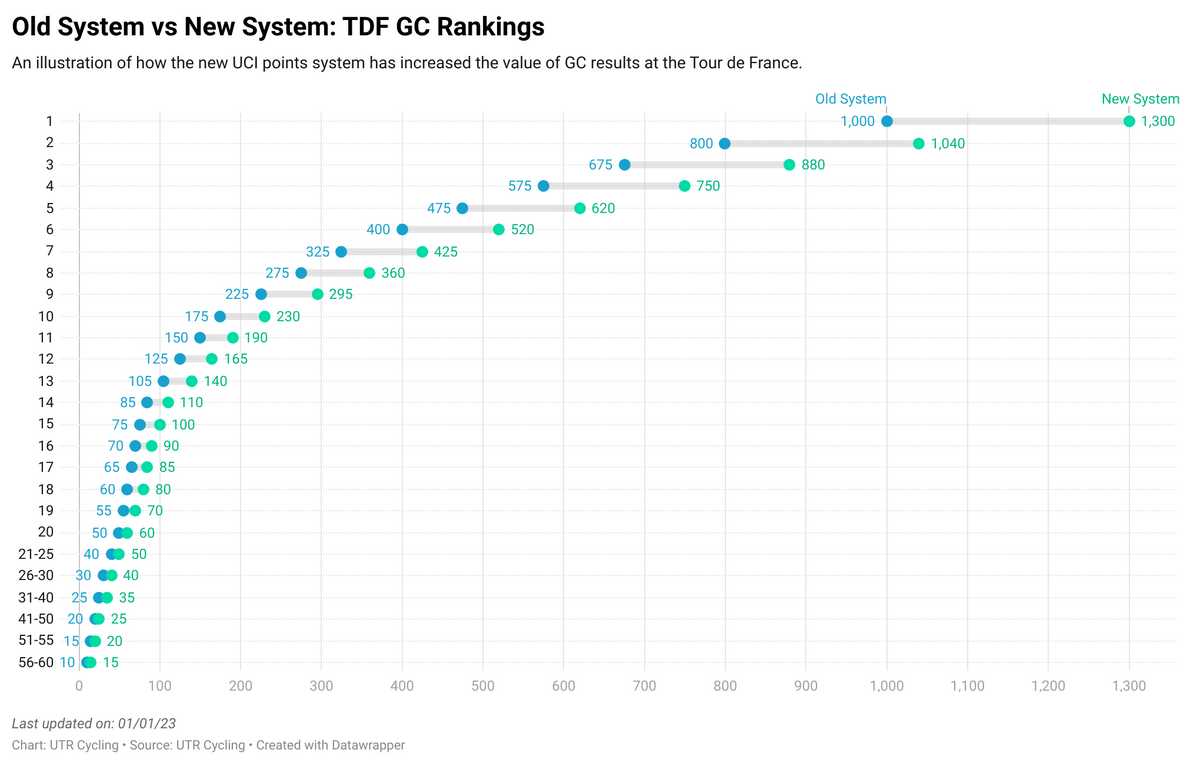A points based preview of the 2023 Tour de France.

Following criticism of its understated importance in the previous iteration of the UCI points system, the new model aims to rectify this deficiency by upgrading the significance of stage wins and GC placings compared to smaller events. This article aims to understand whether the UCI have been successful in achieving this aim.
This graph illustrates the new iteration of the points system provides greater reward for the final general classification standings, with an average increase of 30% on the previous system per position. Under the new system, finishing 13th place overall provides a larger number of points than winning a first class race. By comparison, finishing 12th overall would only equal the 125 points awarded to the winner of a first class race. Thus, this shows a recalibration of the points relationship between different race categories since it decreases the importance of 'smaller races'.
A similar trend is evident with the relationship between Pro. races and the Tour, since winning the Tour is now equivalent to six Pro. victories and one fourth place, compared to the five Pro. victories that would have been needed under the old system. Like the Giro therefore, the new UCI points system has successfully upgraded the significance of finishing GC positions at the Tour.
Perhaps the greatest alteration to the updated points system is the expansion of points awarded for stage results. Under the old system, only the top 5 places were awarded points, with victory gaining 120 points (equivalent to 5 points under 12th place overall). Like the Giro, contrastingly, the new system allocates points to the top 15 places and it provides far greater reward to the top 5 spots. As the graph above illustrates, a stage win is 75% more rewarding than under the previous system - and 2nd place is 200% more rewarding. Thus, this means the new system provides a greater appreciation of the level required to achieve the top spots on a stage of the TDF. Most significantly though, 3rd place at the Tour last year is now equivalent to 11th place this time around. Therefore, teams are encouraged to bring squads capable of targeting stage results across varied terrains, as they will be rewarded for consistent top 10s. Consequently, stage-hunting teams are the largest profiteers from the new system because consistent results across multiple stages will provide the greatest increase in points compared to 2022.
This increased incentivisation of consistent stage results has encouraged teams to bring multi-pronged approaches, rather than concentrating a squad around supporting one rider. For example, multiple teams begin the race with a sprinter and a GC rider, who would be capable of stage results through mountain breakaways should they drop out of GC. This allows them to target the majority of stages, enabling them to pick up points consistently throughout the race. At the Giro d'Italia, Jayco-AlUla were particularly effective using this tactic, finishing in the top 10 on over 70% of the 21 stages. If a team can replicate this success at the Tour, they will accumulate at least 450 points - which would be more points than finishing 7th place overall.
